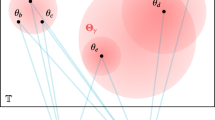Abstract
Prima facie, accounts of scientific representation should illuminate how models support justified surrogative reasoning while remaining neutral on the nature of inductive inference. We argue that doing both at once is harder than it first appears. Accounts like “DEKI,” which distinguish justified and unjustified surrogative inferences by appealing to a distinction between derivational and factual correctness, cannot accommodate non-formal, non-rule-based accounts of inference such as John Norton’s material theory of induction. In contrast, a recent expressivist-inferentialist account appears compatible with material inference, but at the cost of abandoning inductive neutrality.


Similar content being viewed by others
Notes
We could add a third type, Model-Entry Transitions, that concern inferences that go into the production of the model/map, but such inferences are external to surrogative reasoning proper, so we set them aside.
Even if he himself focuses on inferences he takes to be “deductively valid” (Swoyer 1991, p. 500 n4).
Millson and Risjord (2023b) insist that, even with the derivational-factual correctness distinction, DEKI is unable to distinguish justified from unjustified inferences. For our purposes, we refrain from taking a position on this issue.
For an incompressible fluid the Navier-Stokes equations read as:
$$-\nabla p+\eta {\nabla }^{2}{\textbf{v}}=\rho \frac{\partial {\textbf{v}}}{\partial t}+({\textbf{v}}\cdot \nabla )\rho {\textbf{v}},$$where \(\rho\) is the density, \(\eta\) the viscosity coefficient, and \({\textbf{v}}\) is the velocity of the fluid.
Thanks to an anonymous reviewer for highlighting this point.
We thank an anonymous reviewer for pushing us to make this point clearer and for the example of a Bayesian version of KMR.
A way to create the required space is by appealing to a teleological function. Springle’s (2021) analysis of representation may be especially promising, as this analysis suggests that epistemic representations function to enable non-accidentally successful surrogative inferences about a target system.
We thank an anonymous reviewer for encouraging us to make this point explicit.
References
Cheng, T.-P. (2013). Einstein’s physics: Atoms, quanta, and relativity derived, explained, and appraised. Oxford University Press.
Einstein, A. (1926/1956). Investigations on the theory of Brownian movement. In R. Fürth, & A. D. Cowper (Eds.), Dover Publications.
Frigg, R., & Nguyen, J. (2020). Modeling nature: An opinionated introduction to scientific representation. Springer.
Frigg, R., & J. Nguyen. (2023). DEKI and the mislocation of justification: A response to Millson and Risjord. In Lawler et al. (2023) (pp. 296–301).
Khalifa, K., Millson, J., & Risjord, M. (2022). Scientific representation: An inferentialist-expressivist manifesto. Philosophical Topics, 50, 263.
Lawler, I., Khalifa, K., & Shech, E. (Eds.). (2023). Scientific understanding and representation. Routledge.
Millson, J., & M. Risjord. (2023b). DEKI and the justification of surrogative inference: A response. In Lawler et al. (2023b), (pp. 301–306).
Millson, J., & M. Risjord. (2023a). DEKI, denotation, and the fortuitous misuse of maps. In Lawler et al. (2023a), (pp. 280–296).
Norton, J. D. (2003). A material theory of induction. Philosophy of Science, 70, 647–670.
Norton, J. D. (2021). The material theory of induction. University of Calgary Press.
Shech, E. (2015). Scientific misrepresentation and guides to ontology: The need for representational code and contents. Synthese, 192(11), 3463–3485.
Shech, E. (2016). Fiction, depiction, and the complementarity thesis in art and science. The Monist, 99(3), 311–332.
Shech, E. (2018). Infinite idealizations in physics. Philosophy Compass. https://doi.org/10.1111/phc3.12514
Shech, E. (2023). Idealization in physics. Cambridge University Press.
Springle, A. (2021). Intentionality: A problem-solving approach. Doctoral Dissertation, University of Pittsburgh.
Swoyer, C. (1991). Structural representation and surrogative reasoning. Synthese, 87, 449–508.
Author information
Authors and Affiliations
Corresponding author
Ethics declarations
Conflict of interest
The authors have no conflicts of interest to disclose.
Additional information
Publisher's Note
Springer Nature remains neutral with regard to jurisdictional claims in published maps and institutional affiliations.
Rights and permissions
Springer Nature or its licensor (e.g. a society or other partner) holds exclusive rights to this article under a publishing agreement with the author(s) or other rightsholder(s); author self-archiving of the accepted manuscript version of this article is solely governed by the terms of such publishing agreement and applicable law.
About this article
Cite this article
Shech, E., Springle, A.A. Inductive neutrality and scientific representation. Synthese 201, 181 (2023). https://doi.org/10.1007/s11229-023-04161-y
Received:
Accepted:
Published:
DOI: https://doi.org/10.1007/s11229-023-04161-y



